Kasama Piña + Chat with Kasama Founder
My interview with Alexandra Dorda, Founder of Kasama Rum discusses building a brand that’s launching in the time of COVID-19 and staying true to her niche.
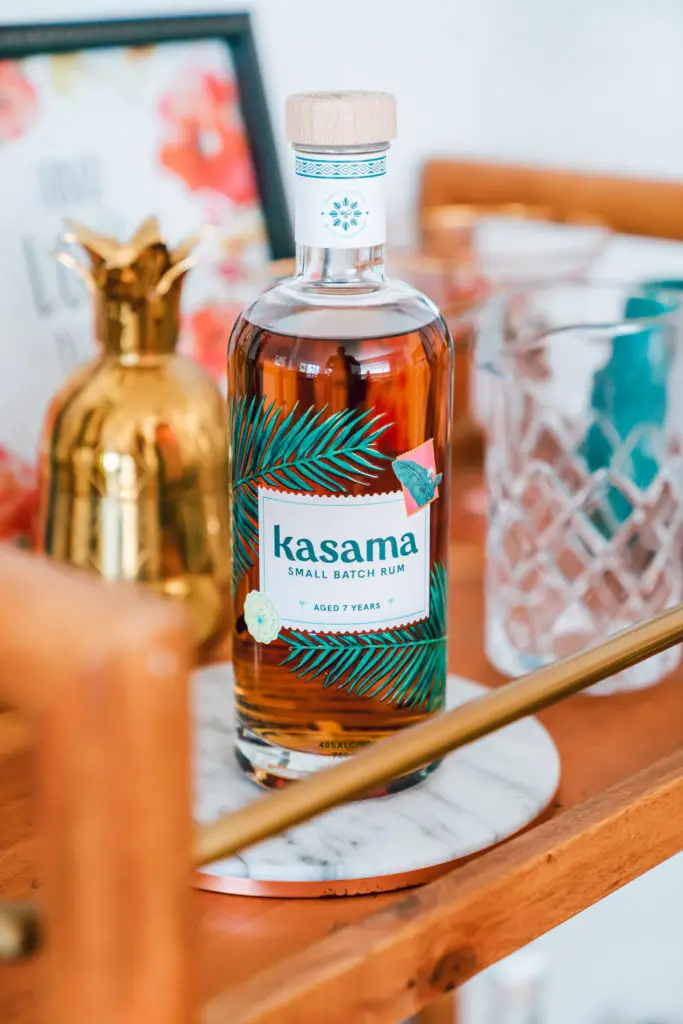
What if you could take a sip of this cocktail and transport yourself to a beautiful island?
We’re not talking about magic potions, but maybe a magic rum. I had the opportunity to chat with Alexandra Dorda, Founder of Kasama Rum, whose rum brand is launching this Fall. Kasama Rum is a fun lifestyle brand that aims to captivate your senses with the slightly sweet and balanced spirit, taking you on a tropical trip without leaving the comfort of your home. Alexandra takes inspiration from her father, who has helped launch and oversee two successful vodka distilleries, and channels her mother’s homeland in the Philippines.
The 29-year-old entrepreneur opens up about her desire to create a visually appealing alcohol brand while also delivering a premium quality rum to the young adult demographic. Although she may be seen as an outlier in the industry, don’t be fooled – she’s been preparing her whole life for this, networking with her family by her side. Now, it’s her opportunity to create more than just a spirit, but also an experience.
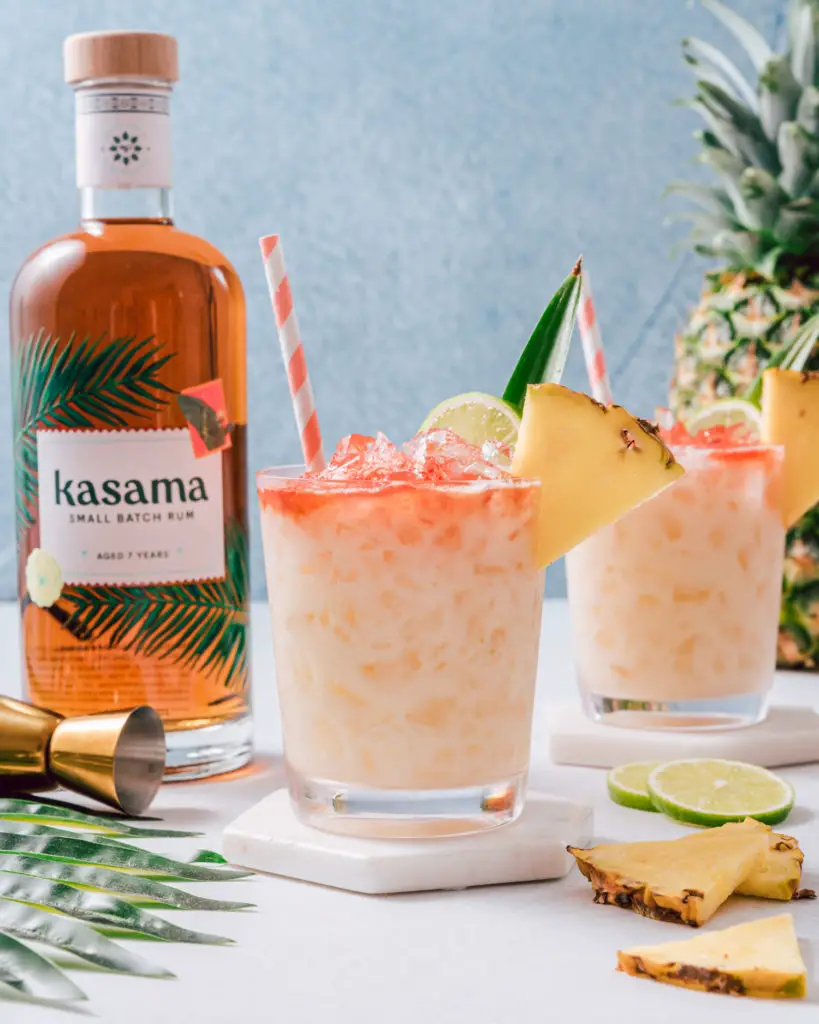
C: I’d love to know more about your role working with your dad and in the family business and how that’s kind of translated into Kasama.
A: “I have to start when I was two years old. So, 27 years ago, my dad started working in the alcohol space, he launched two vodka brands in the United States that you probably know – Belvedere Vodka and Chopin Vodka. Chopin is still owned by us and we are distillers for one of the last vodka companies in the world that actually has a distillery. We make everything ourselves from scratch and our property, and so my love of this business definitely came from my dad.”
I’m an only child and my parents would take me with them everywhere. I remember being a small child and every time we went to a restaurant, we would have to go check the bar. We would have to see if our products were there, check the menu to see if we had a cocktail, we would have to meet the bartender and shake his hand. You know the restaurant industry is a very relationship-oriented business, so things like that are really important.
From a very young age, I was learning about it slowly, and then as I got older, I would start to help with other things, like if we did events or food festivals, I would be there serving things and meeting people. I just think there’s no better thrill in the world than seeing somebody you don’t know, order your product or buy your product, wherever that is, in a store or a bar. That feeling will never get old.
So, I love the business… and then a couple of years ago, I kind of identified this gap in the rum market. I’d always liked rum, I think it’s a super fun spirit, it’s naturally sweet, it has these great vacation connotations, and so I liked it. But I never felt like there was a rum that spoke to me. Rums are either on the low-end, about pirates and sailors and captains which has nothing to do with me. And then at the high end, they’re all these very stiff heritage brands that have this old paper label and an old dead guy on the bottle, and I think there’s certainly a place for both of those things. But I was like, where is my rum? Where is the rum that speaks to me?
I never thought that was a problem for me. I was like, look, I’m Polish. We have a vodka distillery; we don’t have any sugar cane in Poland (for rum-making). And then a couple of years ago, I learned that the Philippines is actually one of the biggest producers of rum in the world. And my mom is from the Philippines. When I heard that, I was like, “oh my God!” Shortly after that, this brand literally popped into my head and I was like, I know what I want it to look like, I know what I want to feel like, there must be people out there like me, who don’t want to be a pirate!
And that’s how it started. That was in 2018, and I’ve been working on it really slowly ever since. I actually still have a day job. I work as an associate for a private equity fund here in Poland. So, it’s really tough balancing, trying to figure out what the next step is, but it’s been a long journey.”
C: So, you’re working regular hours during the day, and when are you finding time to work on Kasama?
A: “That’s a good question… In between, like the nights and weekends. When I have a spare moment at work. I think because I have a full-time job, that’s why it’s taking me so long because I couldn’t dedicate full-time to it, so it definitely kind of just progressed as I was able to work on it. I don’t know… you find the time. My job is very atypical, there are times that are really, really busy and then there are times where we have a bit of downtime, so that’s when I seriously start working on my rum.”
C: I love that you created the rum with yourself in mind and I feel like that’s probably going to have a huge part to play in your success because it very much shows through your branding. The care that you put into all the details of the flavor, it feels very aligned, and I followed along on your Instagram stories and it’s been really cool to watch your process there.
A: “I think people have different things to say about product development. I’ve definitely heard people say, ‘you’re very specific.’ Not many people are Polish/Filipino/American. Or they’ll be like, ‘you’re just a specific niche, you need to design for the masses…’ I don’t necessarily agree with that. I think that there’s an authenticity that shows when you really love something.
I think that there are lots of people out there that I hope this would appeal to. I’m like, ‘why isn’t anybody doing a rum that’s a celebration of the place that it’s from?’ They’re all really kitschy and it’s all about a cartoon parrot on a bottle, and it doesn’t feel natural. [Rum] almost always comes from a really beautiful tropical place… Nowadays, we live on our phones now, it’s all about our imagination and where our mind can take us to, and so many people want to go to a beach! Who doesn’t want to be on vacation with their friends or their family, having a great time?”
C: It makes so much sense though, and those two pieces that you said put together – looking for the gap in the market and finding an actual one. I agree it isn’t about being broad, especially now… There’s a lot out there, so it’s more about being specific and being the bottle that people want on their bar cart because it’s gorgeous, and it makes you think of vacation.
A: “I think so too. I hope so, I hope that we are right about that, but I think there’s a lot of talk in the alcohol industry about what’s going to be next.
Having observed this industry for so long, the trends come in waves. For example, when I was a child, it was all about premium vodka because it was literally invented by these two brands that my dad launched – nobody had premium vodka before. And then it was whiskey after that. 10 years ago, it was tequila. Nobody really sipped on tequila before Patron came around and made it more premium, now a lot of people keep saying, ‘Oh, rum’s going to be next.’ I think the reason it hasn’t happened yet, in my opinion, it’s very product-focused, and I think there’s a place for that, but I think it’s not broad enough to catch on with a lot of people.”
C: I agree, I’m excited to see what happens next. So, what’s your favorite way to sip on rum and how do you imagine a more lifestyle-based rum would kind of shift that a little bit?
A: “I was looking for some autumn/winter cocktails. I have a book all about it, and there are so many cocktails that are actually based on rum. Which pairs really well with cinnamon. Like a hot toddy which is a very classic winter cocktail.
I think that there are so many applications for rum outside of the classic pina colada. It’s so timely to be able to give people vacation in a bottle, especially right now because we can’t actually really go anywhere, I think it’s hopefully transported in a small way for people who are sipping it, even if they’re at home.”
C: I love that too, the idea of taking it and modifying a vacation drink into a more accessible at home kind of beverage that you can sip on.
A: “I was sitting at home during the lockdown and I would experiment with different things. I love to just mix coconut water or lemonade. One time I had some watermelon, I blended it. I was perfect. So, I’m actually doing a series for social media next week… Two-step cocktails.”
C: I wanted to ask you about your tasting notes when selecting rums. Were your runner-ups similar to what Kasama ended up being?
A: “Yes, so I knew what I wanted when I set out to create this, and it was really important to me that it would be accessible. Because I want the brand to not only be for people who love rum, I really want to be a brand for people who don’t like rum. I was looking for a flavor profile that I thought a lot of people would really like. So, I wanted it to be lighter, I wanted it to have a bit of sweetness, but I think a lot of the rums in the market are two sweet, so I was looking for a balance of accessible, slight sweetness, but not too sweet. I wanted it to have a lot of tropical notes that were really important to me and my rum does, thankfully.
The runner-ups were definitely close, and I’ve tested a lot of rums that were not mine, also, I wanted to see what else was out there, see what I like, see what I didn’t like. So, it was definitely a process, but there are worse jobs than tasting rums…”
C: That sounds like fun. It was almost like you’re waiting for the perfect rum flavor and the vision of the bottle and all these things to come together into this perfect culmination.
A: “Literally, because you work on them and they’re so separate and you think pulling the packaging together would be quite simple, I definitely got help from my family’s company and I was like, it’s going to be easy because we already know all the suppliers. It’s so hard, for example – the cap, I waited for the sample for over two months, so you’re kind of working on all these separate pieces and you don’t know how they’re going to come together or when they’re going to come together, and if it is going to work all together. I felt like I was spinning my wheels and not really getting anywhere. You’re waiting for samples. You get the sample. It’s not right. You have to ask for another one. It’s this really long process, but I’m really happy with how it turned out.”
C: What did you decide was most important to focus on… Obviously social media and Instagram have been important to you and building the brand. What have you prioritized?
A: “Definitely, in the beginning, it was all about getting the product ready, so I do have something specific to talk about. Because the product was ready at such a strange time… there was almost nothing I could focus on except for social media because we couldn’t go anywhere, there was nothing to do.
So I actually gave up social media personally almost three years ago. It was kind of a learning process to get back into it, despite being a millennial, it does not come naturally and I had to find someone in the US to help me, that was hard, finding someone remotely to work with is a challenge. So ever since the product came out, I’ve been focusing on social media, but now it’s definitely going to shift, and I have to start focusing on getting actual distribution or getting stores, restaurants to buy it, and then creating demand, and so I’m trying to figure out what’s possible at this moment.”
C: I still think it is an opportunity, especially because you spent so much time creating such a gorgeous, beautiful brand that there will be a demand for it. Even if people can’t go to a restaurant and have a drink, I imagine that if you continue on social media and focus on getting the pictures of your bottle out there on people’s bar carts, there will be a demand for it. Even if the restaurant part takes a little bit longer…
A: “I hope so. It’s so backwards, because, in the business, we say, you build brands on-premise in bars and restaurants because that’s where you can meet the consumer, that’s where you can get them to try it in cocktails, and now it’s backwards because that’s just not possible. So how do you build a brand in liquor stores only? We’re not sure yet. It’s a very strange world in many ways, but also, it’s a very upside-down way to try to build a brand.”
C: But I actually believe that even before COVID, it was shifting – the way that people were getting their information. I think now people are hearing and seeing a product on social media and then noticing that at a restaurant, and then ordering a drink, I’ve done that before.
A: “To some extent, the playing field has been leveled because we’re an independently owned company with a very limited budget, we can’t do so many of the things that some of the bigger players would do, and I think in this instance, it almost does level the playing field because everybody’s dealing with the unknown and nobody knows what’s going to happen, and having a huge budget may help you, but it might not help you, so I think from that perspective, there is an opportunity to be more nimble, to try new things, and so maybe there’s a chance to do something interesting.”
C: Yeah, and people are shopping online. So much more now, some people aren’t even going to the liquor store, the grocery store anymore, they’re just ordering what they know, so I think it’ll be a great opportunity for you actually, like you said, with the playing field a little bit more level.
A: “I try to explain that to people who work in the company who are an older generation and just didn’t grow up on social media the way that we did, and they don’t understand how our generation is driven by the visual element, it’s completely incomprehensible to them because that’s just not how they bought things. There was no social media, it was really about the taste of the product or maybe influences of a different kind, maybe the bartender was much more important back then.”
C: Absolutely. What is the best piece of business advice that you’ve ever been given or that’s kind of guiding you so far?
A: “It’s hard to say… I’m a huge fan of Shark Tank, I remember Mark Cuban saying, ‘perfectionism is the enemy of every entrepreneur.’ I’m certainly a perfectionist, and there are many times when I’ve gotten hung up because I was like, it’s not exactly how I want to be in. Maybe the color of the paper isn’t exactly how I envisioned it in my mind. And I actually turn to that quote a lot. Obviously, everything I do has to be really high quality and really high standards, but it’s so important at some point just like, it’s already really good, you need to keep going or else you can get trapped for seeking perfection and then not a business, so that’s one thing that I’d really turn to a lot over the last two years. Just trying to keep it moving forward…”
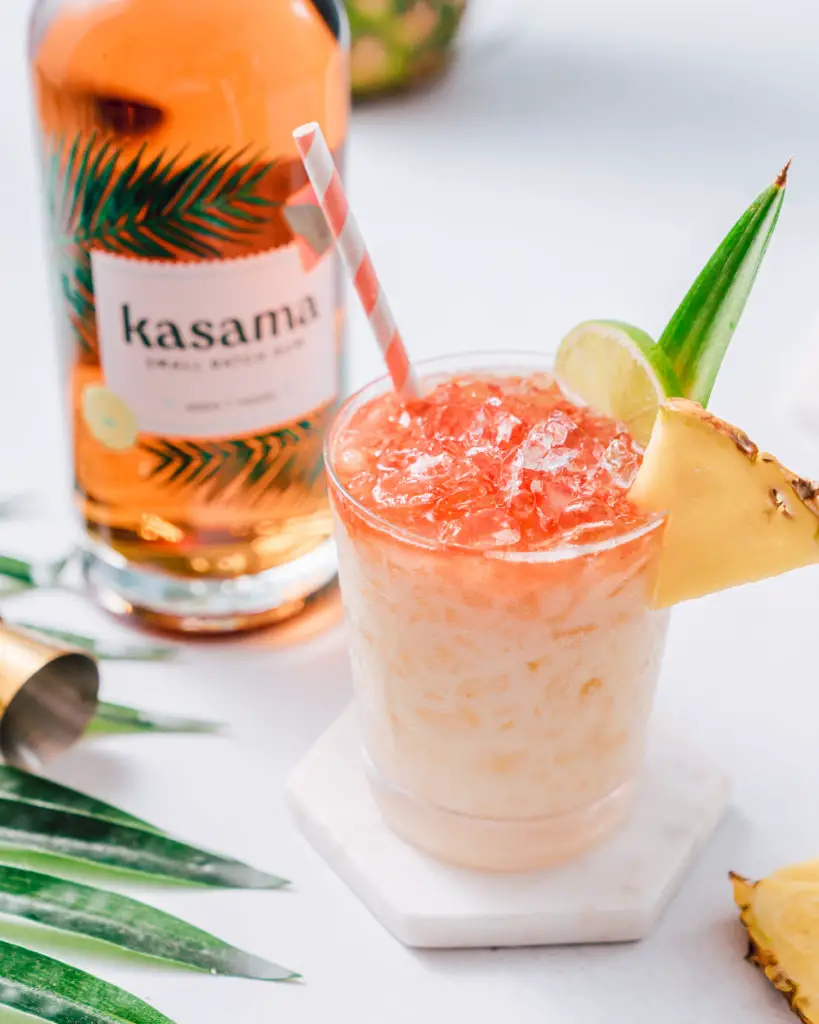
C: That speaks to me too because I’m also a perfectionist, and I could spend probably forever just like on little details. But I think that’s a lot of people who build something and spend their whole time building something to be so perfect and years have passed and then you’re like, Wait, what happened?
If there was another young woman interested in maybe starting a food or a beverage type of business, what would your personal advice be based on your experience so far?
A: “I think two things. The first thing I would say is, you have to be in love with it. I think that there are lots of good business ideas out there, but if you’re not super into building a business it’s so hard. There are so many people who will constantly tell you it’s a bad idea, or it’s never going to work, or why you? And so I think you have to literally be in love with it in order to make it work, so if you just see a business opportunity but you’re not passionate about it, I would say don’t do it until you find something that you are literally in love with.
The second thing is… one of my mottos in life is “just ask.” Just ask people for help, I’ve been so amazed along the way from how many people that I don’t even know, that I reach out to on LinkedIn and are willing to give their time and advice.
So, I would say, just ask away. There are so many things that I didn’t know that I still don’t know about this business or this industry, and I ask. That’s what I would say is just ask for help, and I think a lot of people can be surprised by how many people are actually willing to give their help.”
Kasama Piña
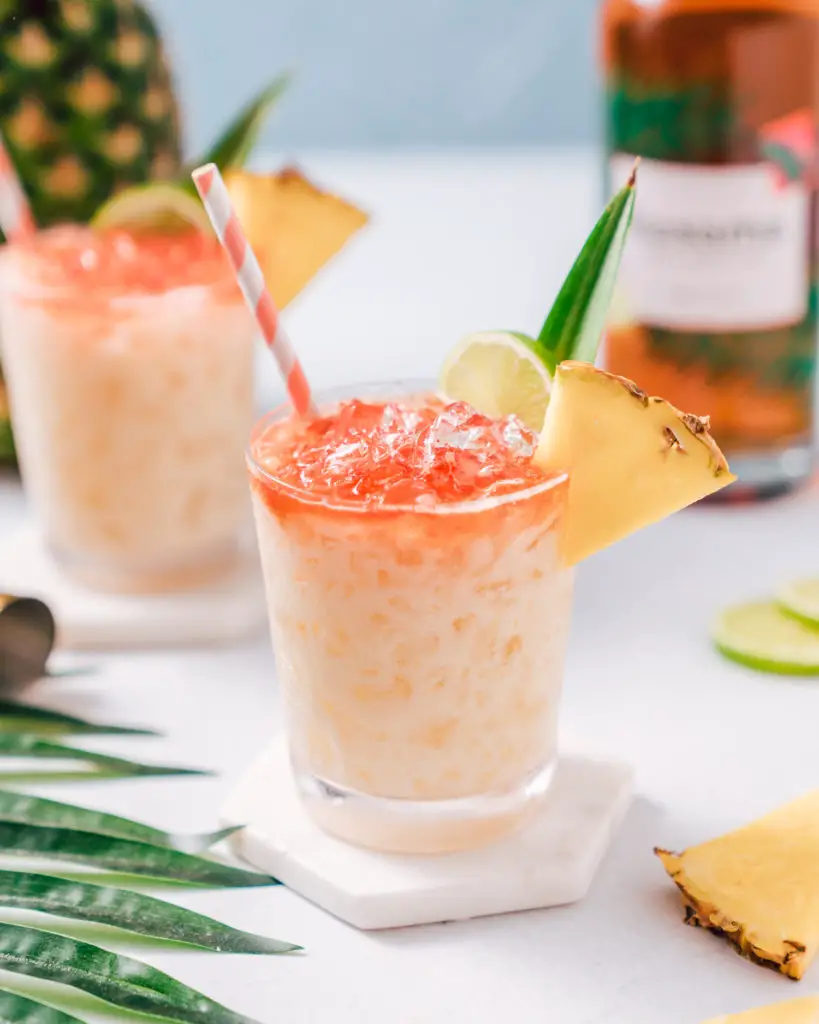
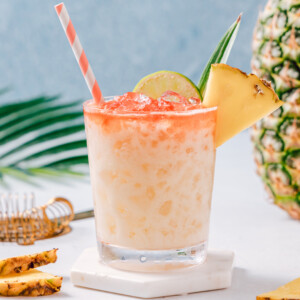
Kasama Piña
Ingredients
- 2 oz Kasama Rum
- 1 tbsp canned coconut milk
- 1 ½ oz coconut water
- 1 ½ oz pineapple juice
- 4 dashes bitters
Equipment
- Strainer
Instructions
- Add Kasama rum, coconut milk, coconut water and pineapple juice to a cocktail shaker with ice and shake.
- Strain into a glass over fresh ice.
- Top with a few dashes of bitters and enjoy!




